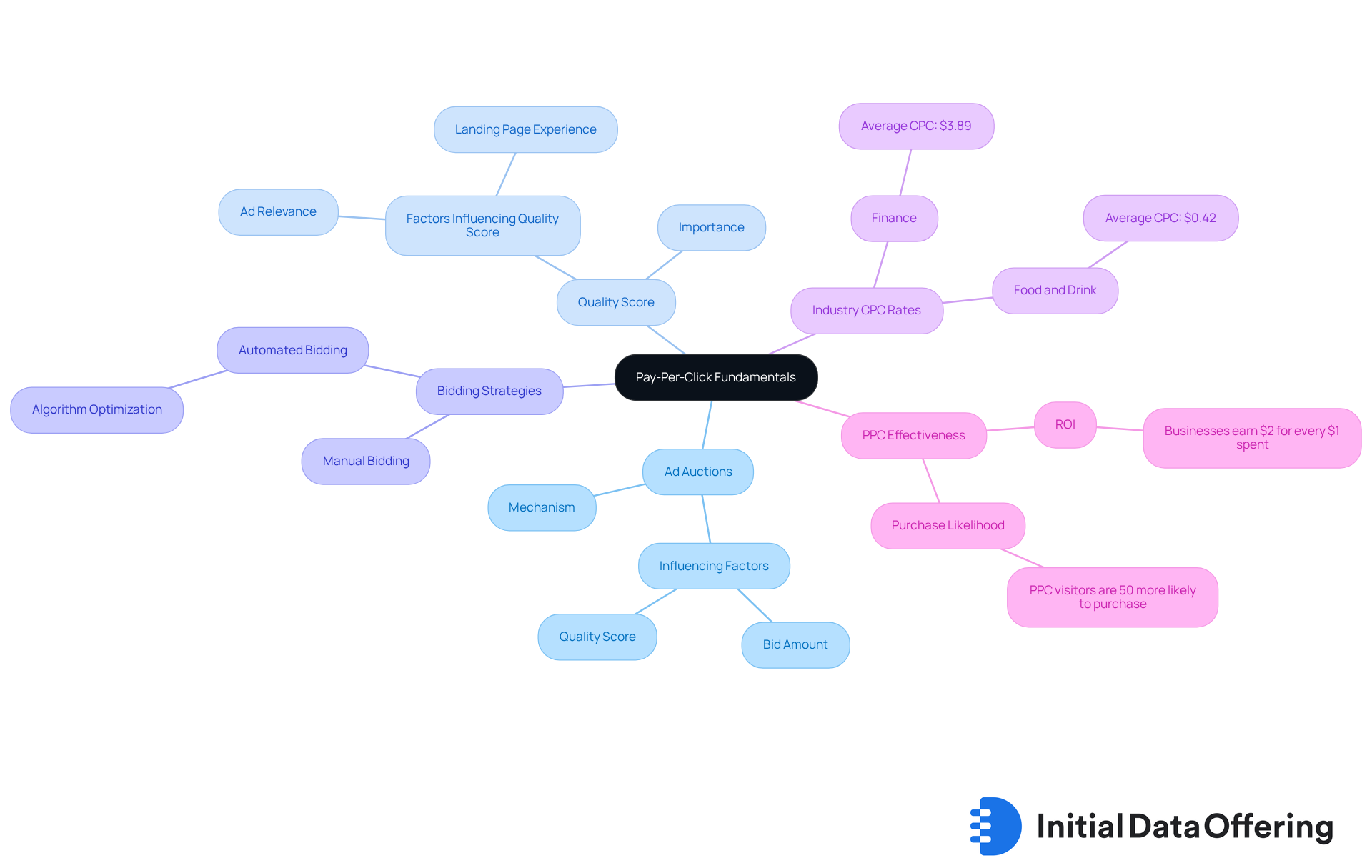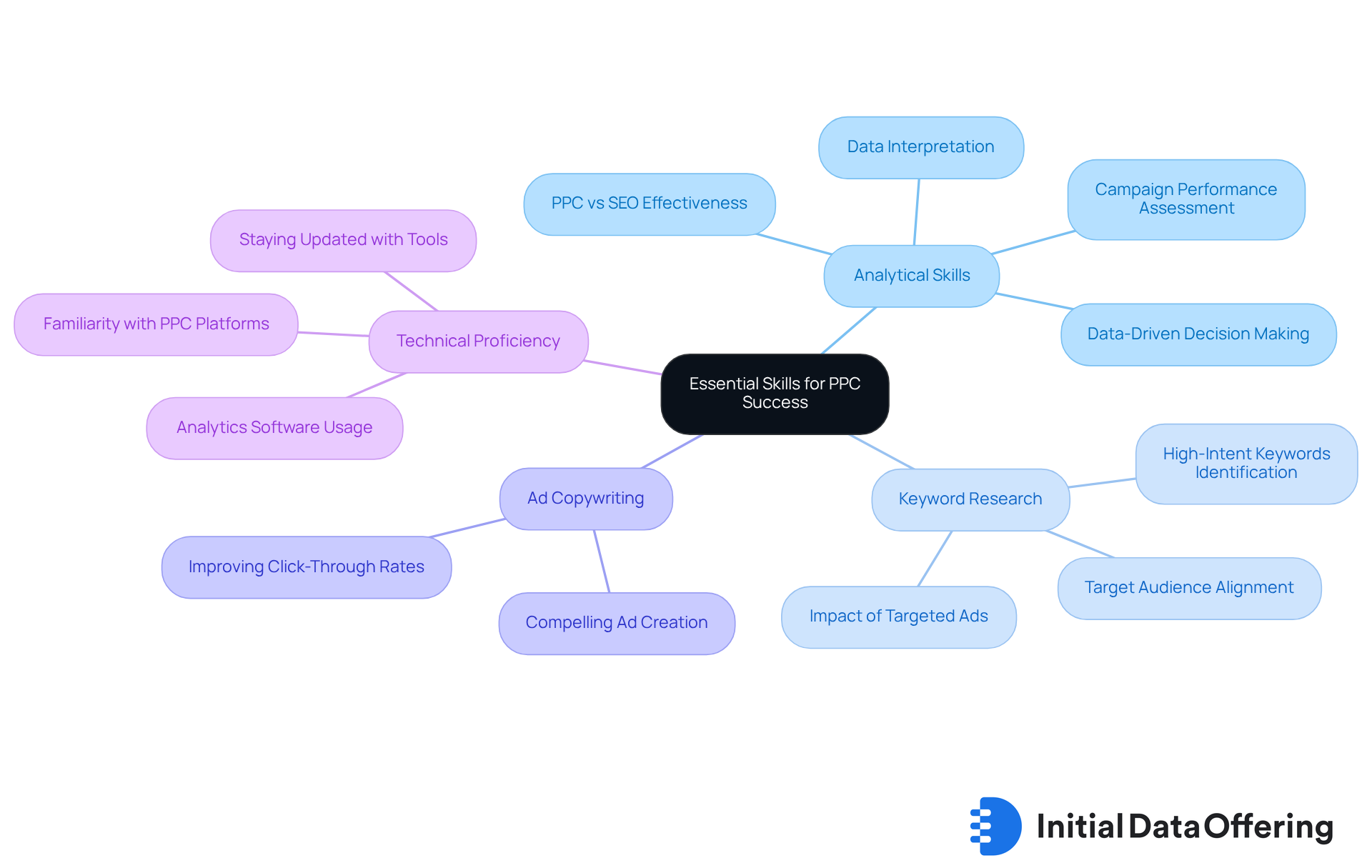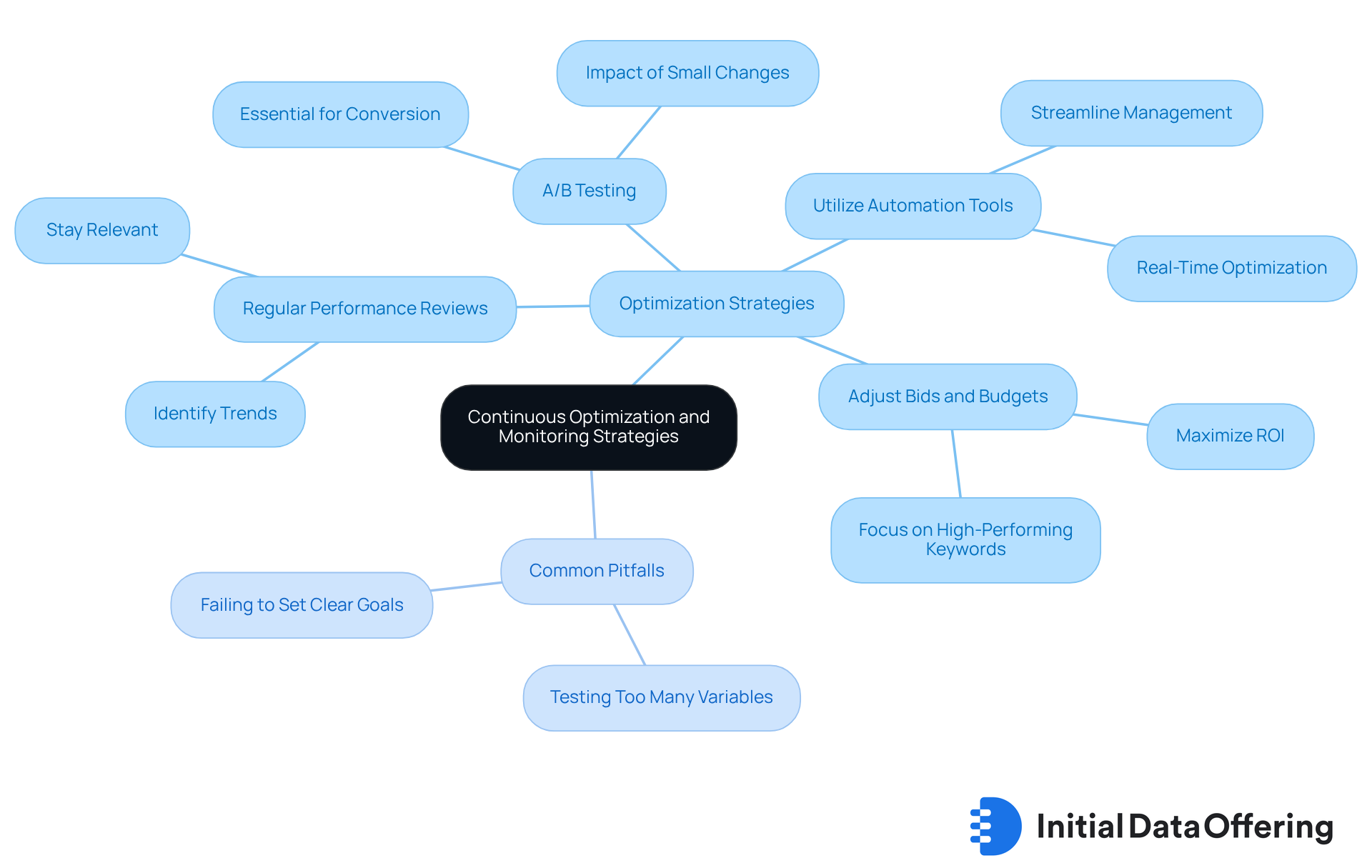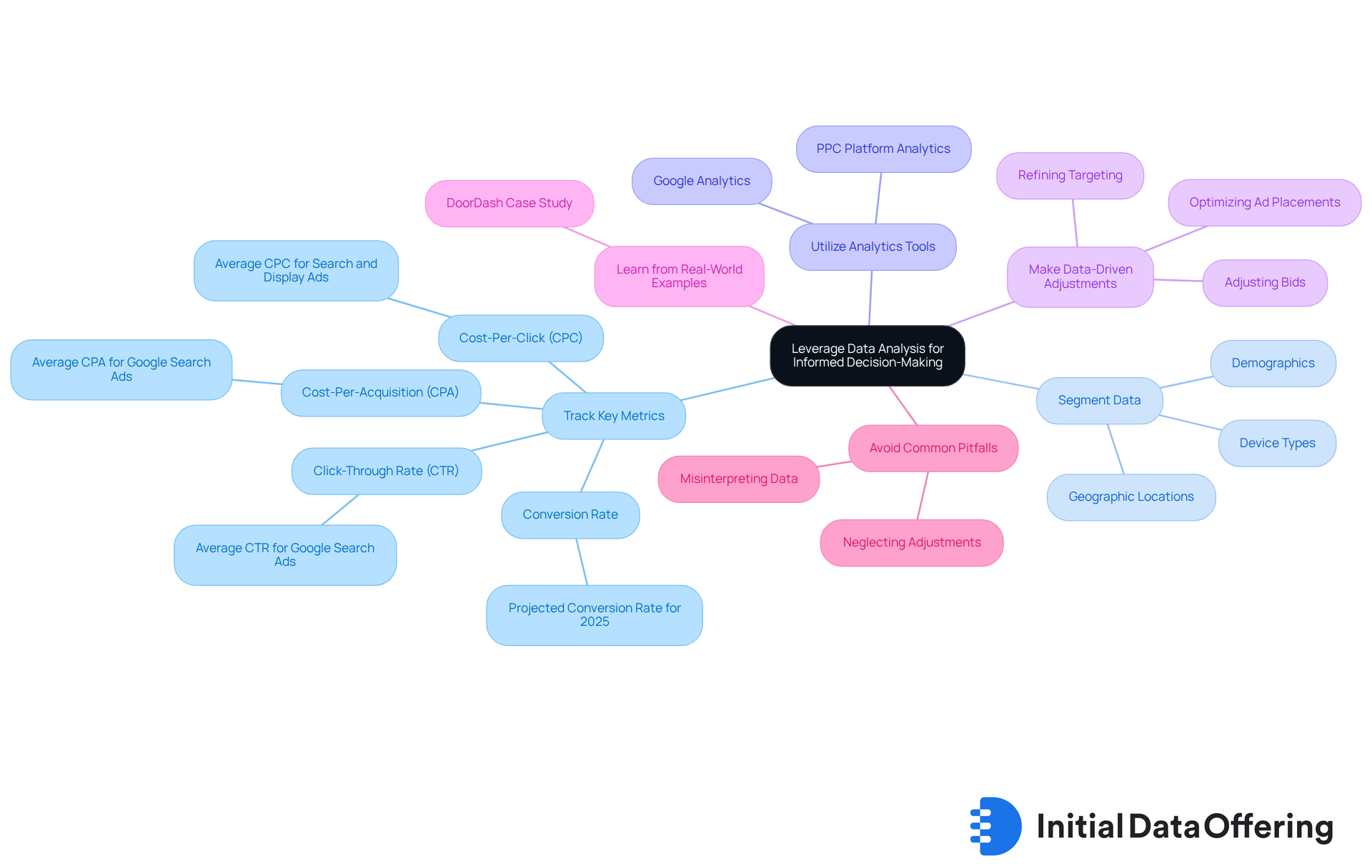Master Pay Per Click Consulting: Key Strategies for Success

Master Pay Per Click Consulting: Key Strategies for Success
Overview
This article outlines essential strategies for mastering pay-per-click (PPC) consulting. It emphasizes the significance of grasping PPC fundamentals, cultivating vital skills, and utilizing data analysis for effective campaign optimization. By detailing components such as ad auctions and quality scores, it illustrates the necessity of analytical skills and effective keyword research. Moreover, it underscores the importance of continuous monitoring and adjustments to improve campaign performance and return on investment (ROI).
Understanding the foundational elements of PPC is crucial. Ad auctions determine the visibility of ads, while quality scores affect ad placement and costs. Developing strong analytical skills enables consultants to interpret data effectively, leading to informed decision-making. Effective keyword research is essential for targeting the right audience, ensuring that campaigns reach potential customers.
Continuous monitoring and adjustments are vital for success in PPC consulting. By regularly analyzing campaign performance, consultants can identify areas for improvement and make necessary changes to enhance results. This proactive approach not only boosts campaign performance but also maximizes ROI. As you consider these strategies, reflect on how they can be applied to your own PPC efforts for optimal results.
Introduction
Mastering Pay-Per-Click (PPC) advertising is no longer merely an option for marketers; it has evolved into a necessity within an increasingly competitive digital landscape. As businesses strive to optimize their advertising budgets and maximize returns, understanding the intricate mechanisms of PPC—from ad auctions to quality scores—can unlock significant opportunities for growth.
However, with the continuous evolution of trends and the complexities of data analysis, how can marketers ensure they are not only keeping pace but also excelling in their PPC strategies?
Understand Pay-Per-Click Fundamentals
Pay-Per-Click (PPC) advertising represents a performance-based model where advertisers incur a fee each time their ad is clicked. This approach is predominantly utilized in search engine advertising, enabling businesses to bid on keywords that align with their offerings. Mastering the complexities of pay per click consulting—such as ad auctions, quality scores, and bidding techniques—is essential for enhancing campaign performance. Familiarity with leading platforms like Google Ads and Bing Ads is crucial, given their significant share of the PPC market.
Key Components of PPC:
- Ad Auctions: This mechanism determines which ads are displayed, influenced by both the bid amount and the quality score of the ad.
- Quality Score: A critical metric impacting ad placement and cost-per-click (CPC), it is determined by the relevance of the ad content and the associated landing page. Higher scores lead to better ad positions and lower costs.
- Bidding Strategies: Advertisers can choose from various approaches, including manual bidding, where they set their own bids, and automated bidding, which utilizes algorithms to optimize bids based on performance data.
In 2025, average CPC rates vary significantly across industries, with finance leading at approximately $3.89, while sectors like food and drink see much lower rates around $0.42. Understanding these dynamics allows marketers to make informed decisions, through pay per click consulting and driving higher traffic and conversions. As Branka Vuleta mentions, 'Businesses usually generate $2 for each $1 invested in Google Ads,' emphasizing the potential ROI of successful PPC efforts. Furthermore, PPC visitors are 50% more likely to make a purchase than organic visitors, underscoring the effectiveness of this advertising model. To avoid common pitfalls, marketers should be aware of challenges such as managing PPC budgets and optimizing landing pages for better conversion rates.

Develop Essential Skills for PPC Success
To excel in , professionals must develop a diverse set of essential skills that drive campaign success.
Key Skills for PPC Success:
- Analytical Skills: Mastery in interpreting data and metrics is crucial for assessing campaign performance and making informed, data-driven decisions. With 49% of PPC marketers believing that handling initiatives has grown more difficult, the necessity for robust analytical skills becomes evident. Moreover, PPC converts approximately 50% better than SEO and is easier to measure than organic search, underscoring the importance of analytical skills in achieving effective results.
- Keyword Research: Expertise in recognizing high-intent keywords is essential for aligning initiatives with target audiences and accomplishing business goals. For instance, targeted LinkedIn ads have demonstrated a 33% increase in purchase intent, illustrating how effective keyword alignment can drive significant outcomes.
- Ad Copywriting: Crafting compelling ad copy that resonates with users is vital for encouraging clicks. Successful pay per click consulting asserts that well-written ads can dramatically improve click-through rates, making this skill indispensable for campaign success.
- Technical Proficiency: Familiarity with PPC platforms and tools, such as Google Ads and Bing Ads, along with analytics software, is necessary for effective management of promotions. As digital marketing evolves, staying updated with the latest tools and technologies is paramount for success.
Investing time in training and practice in these areas will significantly enhance a marketer's ability to manage and optimize their pay per click consulting efforts effectively, ultimately leading to better performance and higher returns on investment. It is also vital to evade typical traps, such as ensuring consistency between ad copy and landing page details, to enhance overall effectiveness.

Implement Continuous Optimization and Monitoring Strategies
To ensure that efforts remain effective, continuous optimization and monitoring are essential. Here are some strategies to implement:
Optimization Strategies:
- Regular Performance Reviews: Schedule weekly or monthly reviews of campaign performance metrics to identify trends and areas for improvement. Frequent evaluations assist marketers in staying in tune with evolving market dynamics and user behavior, ensuring that plans remain pertinent.
- A/B Testing: Conduct A/B tests on ad copy, landing pages, and bidding strategies to determine what resonates best with your audience. A study discovered that 70% of marketers view A/B testing as essential for enhancing conversion figures. For instance, Helzberg Diamonds boosted their click-through percentage by 26% simply by adding arrow icons to their call-to-action buttons, demonstrating the impact of small changes. As highlighted by specialists, pay per click consulting emphasizes that A/B tests are essential for a PPC strategy because they enable you to compare various aspects of your ads to identify which version results in a higher conversion rate.
- Adjust Bids and Budgets: Based on performance data, adjust bids for high-performing keywords and reallocate budgets to maximize ROI. This data-driven approach ensures that resources are focused on the most lucrative opportunities, maximizing return on investment. PPC advertising has an average ROI of 200%, emphasizing the importance of strategic budget allocation.
- Utilize Automation Tools: Leverage automation features within PPC platforms to streamline management and optimize bids in real-time. Automation can enhance efficiency, allowing marketers to respond swiftly to performance fluctuations.
Common Pitfalls to Avoid:
While implementing these strategies, be mindful of common pitfalls in A/B testing, such as testing too many variables at once or failing to set clear goals. These missteps can skew results and hinder effective optimization.
By implementing these strategies in their pay per click consulting, marketers can boost the effectiveness of their efforts and ensure they are reaching their desired goals, ultimately resulting in enhanced conversion figures and a more robust presence in the digital environment.

Leverage Data Analysis for Informed Decision-Making
Data analysis plays a crucial role in optimizing PPC strategies, offering marketers the ability to enhance their campaigns significantly. Here are key practices to leverage data effectively:
- Track Key Metrics: Monitoring essential metrics such as click-through rates (CTR), conversion rates, and cost-per-acquisition (CPA) is vital for gauging campaign performance. For instance, the average CTR for Google Search ads is approximately 3.17%, while the average conversion rate is projected to reach 7.52% in 2025. Moreover, the typical expense per click (CPC) across sectors is approximately $2.69 for search advertisements and $0.63 for display advertisements. These figures provide a broader context for assessing effectiveness and guiding strategic decisions.
- Segment Data: Breaking down data by demographics, device types, and geographic locations allows marketers to identify trends and customize strategies accordingly. This segmentation not only highlights high-performing segments but also enables marketers to modify their approaches to , ultimately leading to more effective campaigns.
- Utilize Analytics Tools: Employing tools like Google Analytics and PPC platform analytics can yield deeper insights into user behavior and campaign effectiveness. These tools provide valuable data on user interactions and conversion paths, enabling marketers to make more informed decisions that enhance overall campaign performance.
- Make Data-Driven Adjustments: Utilizing insights gained from data analysis is essential for refining targeting, adjusting bids, and optimizing ad placements. For example, businesses focusing on high-value audiences can significantly improve their return on ad spend (ROAS), which can reach as high as 800% in some cases. As Benard Kiplangat observes, 'PPC traffic converts 50% more effectively than organic traffic,' highlighting the efficiency of well-optimized PPC approaches.
- Learn from Real-World Examples: Consider the case of DoorDash, which achieved 15x higher conversion rates at half the cost per action by utilizing a mix of image and video assets in their advertising approach. This example demonstrates the tangible advantages of data-driven decision-making in PPC initiatives, encouraging marketers to adopt similar strategies.
- Avoid Common Pitfalls: Awareness of potential errors in PPC data analysis, such as misinterpreting data or neglecting to modify approaches based on insights, is crucial. Regularly reviewing and refining your approach can help prevent these issues, ultimately enhancing overall campaign performance.
By effectively leveraging data analysis, marketers can make informed decisions that enhance their PPC strategies and drive better results. How can you apply these insights to improve your own campaigns?

Conclusion
Mastering Pay-Per-Click (PPC) consulting is essential for businesses aiming to maximize their online advertising efforts. Understanding foundational elements such as ad auctions, quality scores, and effective bidding strategies allows marketers to significantly enhance campaign performance. Developing key skills—analytical thinking, keyword research, ad copywriting, and technical proficiency—is crucial for navigating the complexities of PPC advertising. These competencies empower marketers to craft strategies that lead to improved outcomes.
Throughout this article, various strategies have been highlighted to ensure continuous optimization and effective monitoring of PPC campaigns. Regular performance reviews, A/B testing, and data analysis are vital practices that enable marketers to refine their approaches and improve conversion rates. The ability to leverage data effectively—tracking key metrics and segmenting information—empowers marketers to make informed decisions, resulting in better outcomes and higher returns on investment.
In conclusion, the significance of adopting a strategic and informed approach to PPC cannot be overstated. As the digital landscape evolves, staying abreast of the latest trends and best practices in Pay-Per-Click consulting is crucial for achieving success. By implementing the strategies and insights discussed, marketers can not only optimize their campaigns but also ensure they are equipped to meet future challenges. Embracing these practices will ultimately lead to more effective PPC efforts, driving enhanced visibility and profitability in an increasingly competitive marketplace.
Frequently Asked Questions
What is Pay-Per-Click (PPC) advertising?
PPC advertising is a performance-based model where advertisers pay a fee each time their ad is clicked, primarily used in search engine advertising.
How do advertisers utilize PPC?
Advertisers bid on keywords that align with their offerings to display their ads in search engine results.
What are the key components of PPC?
The key components of PPC include ad auctions, quality scores, and bidding strategies.
What are ad auctions in PPC?
Ad auctions determine which ads are displayed based on the bid amount and the quality score of the ad.
What is a quality score and why is it important?
A quality score is a critical metric that affects ad placement and cost-per-click (CPC), based on the relevance of the ad content and the associated landing page. Higher scores lead to better ad positions and lower costs.
What are the different bidding strategies in PPC?
Advertisers can choose between manual bidding, where they set their own bids, and automated bidding, which uses algorithms to optimize bids based on performance data.
How do average CPC rates vary across industries?
In 2025, average CPC rates vary significantly, with finance leading at approximately $3.89, while sectors like food and drink have much lower rates around $0.42.
What potential ROI can businesses expect from Google Ads?
Businesses typically generate $2 for every $1 invested in Google Ads, indicating a strong potential return on investment.
How effective are PPC visitors compared to organic visitors?
PPC visitors are 50% more likely to make a purchase than organic visitors, highlighting the effectiveness of PPC advertising.
What challenges do marketers face in PPC?
Marketers should be aware of challenges such as managing PPC budgets and optimizing landing pages for better conversion rates.